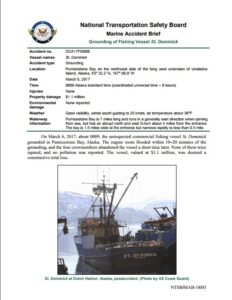On 6 March 2017, the uninspected commercial fishing vessel ‘St. Dominick’ grounded in Pumicestone Bay, Alaska. The engine room flooded within 10–20 minutes of the grounding, and the four crew abandoned the vessel a short time later. None of them were injured, and no pollution was reported, but the vessel, valued at $1.1 million, was deemed a constructive total loss. US NTSB issued an investigation report on the accident.
Findings
Investigators could not determine from crew statements precisely when the bridge watch alarm sounded after the vessel grounded. According to the captain, resetting the bridge watch alarm to 3 minutes, as was normal practice when the vessel completed fishing and was operating near land, could have prevented the accident.
Crew members also stated that they were tired and that the accident was caused by a “general lack of sleep.” A deckhand said that the crew, on average, got about 4–5 hours of rest per day. Investigators noted that this rest was spread between the daytime breaks from fishing and the nighttime cessation of all fishing operations.
The captain said he would average between 4 and 6 hours of rest in a 48-hour period, which equates to about 2–3 hours per day. Further, the amount of sleep in a given day varied as did the times that he slept. On 4 March, he slept while the vessel offloaded and proceeded to the fishing area. Then, during the early morning of 5 March, he slept for 1 to 1.5 hours.
Probable Cause The National Transportation Safety Board determines that the probable cause of the grounding of the St. Dominick was the captain’s failure to monitor the vessel’s track as a result of his fatigue due to an accumulated sleep deficit. Contributing to the accident was the nature of the derby-style fishing that the St. Dominick was engaged in and the captain’s failure to properly set the bridge watch alarm. In December 2014, the fishing vessel Titan grounded in the Columbia River and eventually sank near Cape Disappointment, Washington. Similarly, the captain of the vessel had fallen asleep at the helm while the vessel was navigating through a bend in the channel. The circumstances in the St. Dominick accident were also similar to the February 2015 grounding of the fishing vessel Savannah Ray, which was also investigated by the NTSB. While returning from a cod pot-fishing trip, the vessel grounded near the entrance of St. Paul Harbor, Kodiak Island, Alaska. Investigators determined that the captain fell asleep and failed to negotiate a critical turn. They also noted that the captain’s fatigue was likely attributable to insufficient sleep and because his sleep cycle was interrupted or non-consecutive. As found in other NTSB investigations, open-access, derby-style fishing encourages working longer hours to increase the vessel’s portion of the overall quota set by state regulators. The St. Dominick captain and one of the deckhands stated that the rules for the cod fishery in which the vessel operated promoted around-the-clock operations and contributed to inadequate rest. Explore more by reading the full report:
































































Excessive workload is probably the main reason for fatigue effects leading to loss of attention and awareness with an accident as the “end product”.
Another factor not mentioned at all to my knowledge is the fact that many men suffer from sleep deficit due to serious snoring. I myself did suffer in that respect. Since I have been using a medical device/machine, CPAP, Continuous Positive Airway Pressure, my life has changed dramatically since I always have a good sleep and thus been able to live a safe and comfortable “day-life” without sudden spells of fatigue. I suggest that you see your local GP if you are suffering from fatigue due to heavy snoring. Help is availabel!